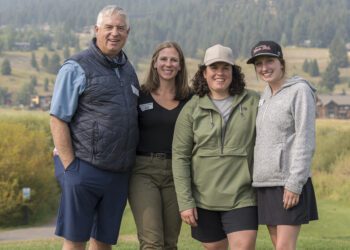By Emily Stifler Wolfe EBS Contributor
LIVINGSTON – When Kelly Ziebarth and Bryan Smith’s son Max was a newborn, he suffered from severe acid reflux. He was so uncomfortable, he struggled to sleep—and so did his parents.
The couple relied on coffee to stave off exhaustion. The trouble was, they didn’t love anything they were drinking.
So Smith took a class from Stephan Diedrich, founder of Diedrich Roasters in Ponderay, Idaho, and started roasting his own coffee beans.
“There were definitely a lot of trials in making it taste good,” Smith admits. “It’s such a complicated process. [Diedrich] said that about 80 percent of people are just turning beans brown. If you do it right, you can do so much more than just roast coffee beans.”
In fact, Smith says, there are approximately 1,500 different chemical properties to a coffee bean. By using both convective and conductive heat in the roasting process, he manipulates those chemicals, bringing out different flavors.

The former finish carpenter tinkered in his shop-turned-roastery, and soon his coffee was so good that he and Ziebarth began sharing it with their friends and family. They, in turn, gave bags to their friends and family.
Fast forward six years. Max has a younger brother, Ollie, who is 3; Smith and Ziebarth have been providing coffee beans to other private labels since 2012, and they recently launched their own brand, Blue Bean Coffee Roasters, a nod to the sought-after coffee beans from the Blue Mountains of Jamaica. Smith is the roast master, and Ziebarth does, as she says, “everything but roasting.”
Their following—all gained through word of mouth—verges on fanatical.
“I’m totally addicted to it,” says Sarah Faye, owner of Faye’s Café in Livingston. “It changed my life. I don’t drink anything else.”
Smith worked with Faye and her customers to create a custom blend that Faye describes as smooth, chocolatey and dark. “It’s like having dessert right away when I wake up.”
Freshness is crucial for flavor like that, Ziebarth says, explaining that coffee from Africa, for example, is harvested at a different time of year from that of South America. Blue Bean orders small amounts—600-700 pounds a month—of the freshest beans they can get their hands on, and then roasts them on-demand in five-pound batches. After roasting, the beans settle for 24 hours, and then are out the door within 48 hours.
Creating the proper roast is also essential, says Smith, who is meticulous. He roasts every new bean four to five different ways, and then hosts a cupping, in which customers, local chefs, friends and family give feedback about each profile. After roasting it three to four times again, he holds a second cupping.
“I’ve been roasting one of the same beans from a farm in Honduras for about four years, and I’m still figuring out ways to tweak that and make it a better coffee.”
Among Blue Bean’s offerings are rainforest certified beans, fair and direct trade, and organic options. In addition to creating custom blends for places like Faye’s and Seven Point Guest Ranch in Paradise Valley, Blue Bean will sell discounted, personalized bags for school and nonprofit fundraisers—Ziebarth worked at the Human Resource Development Council for 10 years, and the value of giving back has stayed with her.
They also recently launched a subscription service, where fresh coffee arrives at your door on a monthly or bi-weekly basis, and already have customers as far flung as Seattle and North Carolina.
Their base, however, is local. A large portion of Blue Bean coffee goes out the door at the Livingston Farmer’s Market, and through direct sales. It doesn’t hurt that both Smith and Ziebarth were born and raised in Livingston.
“There are a lot of bags coffee exchanged just hand to hand—people who just call us up,” Ziebarth said. “I know what the majority of our customers like.”










